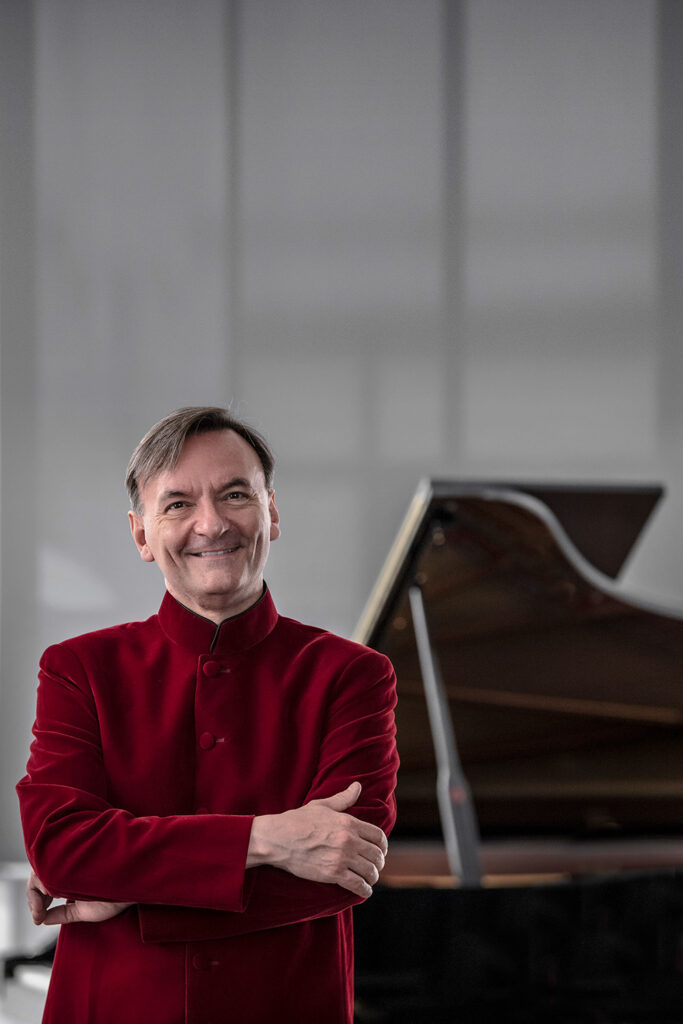Hough’s fiery technique and probing musicianship at their best in wide-ranging FOCM program

Stephen Hough performed a recital for Friends of Chamber Music Tuesday night at Coral Gables Congregational United Church of Christ.
Sir Stephen Hough is a pianistic powerhouse. On Tuesday night, he returned to Friends of Chamber Music for a recital at Coral Gables Congregational United Church of Christ that would have tested the limits of most concert artists’ stamina and agility.
Hough’s dexterity and musicianship swept through all technical challenges. At his best, Hough is a patrician artist who can bring out the profundity and originality in music that can sound shallow in lesser hands. Works by Liszt and Scriabin displayed his interpretive mastery.
“Three Petrarch Sonnets” from Liszt’s Années de Pélérinage Italie presented a vibrant interplay of idiomatic romanticism tinged with deft coloration and lyricism. The aristocratic Chopinesque filigree of Sonnet No. 123 sparkled. Hough’s slower tempo for Sonnet No. 104 built the melodic lines in gradual layers, the climax unforced and organic. In an eloquent, lightly inflected reading of Sonnet No. 47 Hough explored an expressive depth in Liszt’s overheated rhetoric.
That was even more evident in his reading of Liszt’s astringent Après une lecture de Dante Fantasia Quasi Sonata or the “Dante” sonata. The iconic opening bars thundered from the Bosendorfer. Hough executed the lines with accuracy at dazzling speed, evoking the furies of Dante’s trip to the underworld. He turned bombast to poetry, and the elegance and beauty of the central section wa embellished with a kaleidoscopic palette. His perfectly etched trills and fiery runs at the sonata’s conclusion emblazoned a reading of rare distinction, bringing out the creative spark hidden behind the notes.
Alexander Scriabin was one of music’s distinctively original compositional voices. His early works suggest Chopin and Tchaikovsky while his late scores flirt with post-tonal writing.
Scrabin’s Sonata No. 5 finds the composer in the midst of that transition. Both astringent and looking back to its nineteenth century predecessors, the score can be a minefield for the unwitting pianist but Hough’s high-powered virtuosity was fully equal to Scriabin’s demands. In the work’s crashing opening flourishes, Hough’s hands glided wildly across the keys with the many changes of meter deftly assayed. Hough’splaying turned tender and subtle in the sonata’s quieter moments, the mood becoming almost languid. He masterfully delineated Scriabin’s adventurous spirit in a performance that would be difficult to equal, much less surpass.
Hough’s Debussy’s proved less effective. In his traversal of Estampes, his dexterity, fitfully fierce tempos and widely terraced dynamics were impressive. But the impressionistic magic of these three vignettes was in short supply. “Pagodes” emerged best with Hough’s cleanly articulated figuration. The Latin tonal painting of “La soirée dans Grenade” thundered when it should have sung. The hand crossings and pyrotechnics of “Jardins sous la pluie” were accomplished with total aplomb but Hough’s voltage tended toward overdrive.
In place of Hough’s own originally scheduled Sonatina Nostalgica, Hough played a three-movement suite he composed for a Spanish piano colleague. The opening “Overture” in the formal French style elicited a certain grandeur with a rhapsodic episode adding contrast. Hough’s finely textured playing brought out the strength of this strong introductory movement. The two succeeding dances are more notable for speed than subtlety. These quirky creations certainly played to Hough’s technical arsenal in their sheer difficulty. Ultimately, though, this compositional effort was less than distinctive.
Hough has been instrumental in reviving and promoting the music of Catalan composer Federico Mompou (1893-1987) and he opened the concert with Mompou’s five-movement suite Cants Màgics. These miniatures combine impressionism with a meditative Spanish ethos.
In “Obscut,” a simple melody in the left hand becomes intensely dramatic through repetition. Glints of light and pastels embellish the solemn chords of “Profond.” The grandiose sweep of “Misteríos” and thematic grace of “Calma” register Mompou’s affinity for indigenous musical forms.
Hough’s beautifully evocative readings emphasized the music’s charm. He offered another brief Mompou vignette as an encore. Although Mompou specialized in short pieces, his works are splendidly conceived and Hough deserves commendation for his performances and recordings which have given the music greater visibility.
Friends of Chamber Music presents the Ehnes Quartet playing Haydn’s String Quartet, Op. 20, No. 5 in F minor, Bartok’s Quartet No. 6 in D minor and Mendelssohn’s Quartet No. 2 in A minor 8 p.m. April 26 at the FIU Wertheim Performing Arts Center. miamichambermusic.org
Posted in Performances
Leave a Comment
Wed Mar 29, 2023
at 12:12 pm
No Comments






